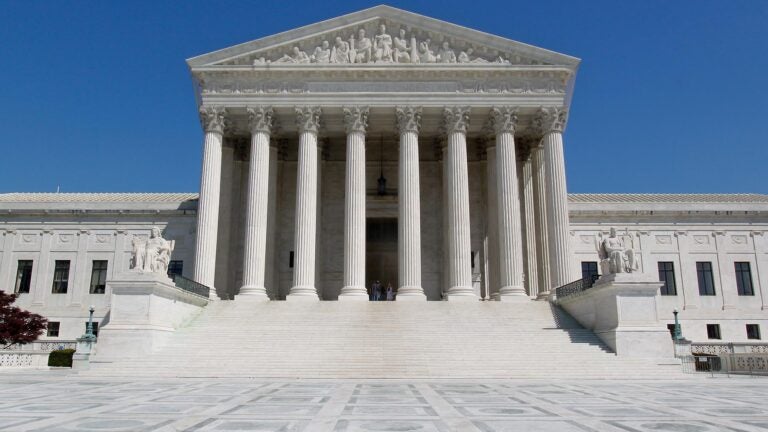
The Supreme Court building in Washington (Photo/Tim Sackton)
Senate confirms Judge Ketanji Brown Jackson to Supreme Court in historic vote: USC experts react
Political and legal specialists share their thoughts on the first Black woman Supreme Court justice in history.
All 50 Democrats in the United States Senate on Thursday backed President Joe Biden’s nominee to the Supreme Court, Judge Ketanji Brown Jackson. They were joined by Republican Senators Susan Collins of Maine, Lisa Murkowski of Alaska and Mitt Romney of Utah. The bipartisan vote means Jackson will be the first Black woman to sit on the highest court upon the retirement of Justice Stephen Breyer — expected at the end of the current Supreme Court term in June or July.
Associate Justice Jackson “will help diversify an institution in which Black women have, through law, custom and practice, been excluded for over two centuries,” said Franita Tolson, professor of law and vice dean for faculty and academic affairs at the USC Gould School of Law.
Tolson noted Jackson’s “top-notch” credentials as a double Harvard University graduate, former Supreme Court clerk, former district court judge and current circuit court judge, and said she is “a highly qualified nominee who will bring a diverse set of experiences to the Supreme Court.”
Other USC scholars credited the civil rights movement and more recent movements such as #MeToo and Black Lives Matter for their part in paving the way for Jackson’s confirmation.
The confirmation of Judge Jackson shows that the civil rights movement is making real progress; this is a transformational moment.
Alison Dundes Renteln, USC Dornsife
College of Letters, Arts and Sciences
“The confirmation of Judge Jackson shows that the civil rights movement is making real progress; this is a transformational moment,” said Alison Dundes Renteln, professor of political science, anthropology, law and public policy at the USC Dornsife College of Letters, Arts and Sciences.
“The important contributions of women of color are being recognized, as they should be, and there is certainly no going back,” continued Renteln.
“Young children will see that equality of opportunity is a reality, more so than before. This is significant; we should not underestimate the power of role models.”
First black woman Supreme Court justice: Historic choice, for more than one reason
Jackson’s confirmation is not going to change the ideological split on the court, said Jody Armour, the Roy P. Crocker Professor of Law at the USC Gould School and an expert on the intersection of race and legal decision making.
“There are currently six conservative justices and three liberals, and she’s replacing Justice Breyer, who is considered a liberal justice,” he said. However, he believes her confirmation “is of profound historical significance.”
And that’s not only because she will be the first Black woman Supreme Court justice. Jackson will be the first public defender on the Supreme Court and the first justice in more than three decades to have represented criminal defendants. The last was Justice Thurgood Marshall, who retired in 1991 — and was the first Black Supreme Court justice.
Jackson worked in the Office of the Federal Public Defender in Washington, D.C., from 2005–2007, when the D.C. District Court was reviewing the legal claims of Guantanamo Bay detainees. Questions from several Republicans during Jackson’s confirmation hearings were intended to convince their colleagues and the public that she has too much empathy for criminals and terrorists and not enough empathy for victims, said Armour.
The Constitution protects the individual against the state. … Her empathy is not for criminals; it’s for the Constitution.
Jody Armour, USC Gould School of Law
“The Constitution protects the individual against the state,” said Armour. “That’s what due process means. Her empathy is not for criminals; it’s for the Constitution.”
Robert Shrum, director of the Center for the Political Future at USC Dornsife and a former political strategist, described the Republicans’ line of questioning a “partisan bloodbath focused on ugly and disgraceful accusations about her work as a public defender.”
“What was she supposed to do, fail to make the best case for her clients?” asked Shrum. “That would have been a dereliction of her sworn duty.”
As Jackson herself explained during the hearing: “Defense lawyers perform a service, and our system is exemplary throughout the world precisely because we ensure that people who are accused of crimes are treated fairly.”
The newest Supreme Court justice appears unscathed by the criticism lobbed at her during the hearings. A recent poll showed Jackson’s nomination was supported by 66% of Americans — making her possibly the most popular nominee since pollsters started asking Americans about the Supreme Court.
“Despite political polarization, our government has demonstrated it can function properly,” said Renteln. “This is truly a day to rejoice.”



